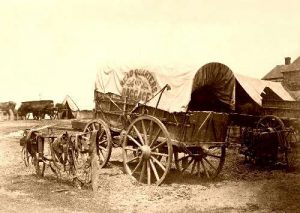When we last left off, Salathiel was in General Hospital Number 15 in Nashville, Tennesse under the care of Dr. William M. Chambers. Salathiel knew Dr. Chambers before the war, and continued to receive treatment from him even after the war. It seems odd to me that Salathiel would magically end up in the care of his hometown doctor, so I presume that his commanding officers in the 123rd Regiment, all of whom were from the Charleston, Illinois vicinity, deliberately sent Salathiel to Dr. Chambers’ hospital.
Salathiel stayed there for about a month and then was granted a furlough to return home! Although I’m sure his family was delighted to have him back home, his poor health probably made things difficult for everyone concerned. He returned to his Regiment sometime in November 1864 (there are conflicting dates in the Pension records) but was soon re-admitted to a hospital, this time to the Cavalry Corps Hospital in Gallatin, Tennessee. Gallatin is a suburb of Nashville, and Nashville was a major hub for Union hospitals during the war. Being a Cavalry Hospital, Gallatin was probably the proper one for soldiers in Wilder’s Brigade to receive care – in other words, Salathiel was no longer getting special dispensation to see his own doctor.
The pension records show that his major ailment during this period was “aphonia” – an antiquated term that means loss of voice. Although the term was sometimes used to describe severe laryngitis, in Salathiel’s case it had a much more literal meaning. According to Salathiel’s grandson, Ellis Graves, Salathiel “lost for a time the power of speech”. As we saw in our discussion of Typhoid Fever,”…the disease can paralyze the laryngeal tissues (vocal cords).” One of the forms in his pension file states that “for twenty-two months he had complete aphonia”. He continued to suffer frequent attacks of hoarseness even twenty years later.

Salathiel was transferred from Gallatin to the Cumberland General Hospital on February24, 1865 – probably as part of the discharge process, and then returned to duty on February 27. From that point on, however, Salathiel probably did not ride in the Brigade nor carry a gun. Records show that he was “detailed with the wagon train”.
While Salathiel was in the wagon train, the regiment took part in Wilson’s Raid and finally, the Battle of Selma on April 2, 1965. A week later, Lee surrendered and the week after that. President Lincoln was assassinated.
It took another couple of months for the Regiment to be “mustered out”. The records show that Salathiel concluded his military service on June 6, 1865.
Next time, we’ll wrap up with a look at the details of the pension that Salathiel ultimately received.
